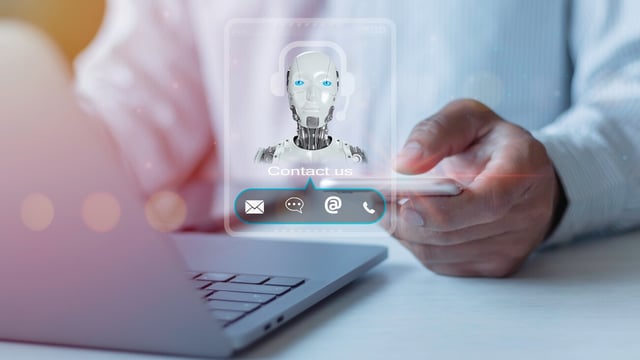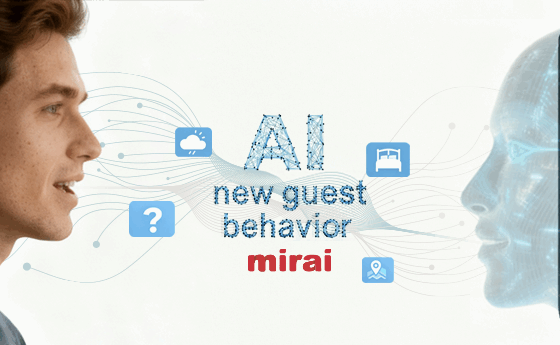
The “in the moment” nature of the travel, hotel, and hospitality industry is all about customer service: taking care of consumers through attentive agents and staff and personalized, meaningful digital experiences. Agents are the core of their business, so it makes sense that “agentic AI” is poised to revolutionize the industry.
Agentic AI was identified as the No. 1 trend in Gartner’s Top 10 Strategic Technology Trends for 2025. What does agentic AI mean, and what do companies need to properly institute an agentic AI strategy?
What Agentic AI Is — and Isn’t
At the most basic level, agentic AI unleashes the power of AI agents that aren’t just reactive tools but intuitive collaborators — capable of creating a plan at runtime to reach goals, executing complex workflows, and communicating with other agents or humans across systems. These AI agents are autonomous and designed to act independently, within the boundaries that have been set by an enterprise.
AI agents are different from AI assistants such as GenAI copilots, LLM (Large Language Model) assistants and RPA (Robotic Process Automation) bots, all of which are reactive, carrying out well-defined, clearly structured tasks at a user’s request. In contrast, agentic AI agents are intuitive problem solvers, working autonomously within the current context, with data, interfaces and tools on-hand to achieve a specific goal for a hospitality brand with executive supervision. They are goal-oriented, self-directed, and operate across departments and data systems with low human prompts to orchestrate complex automation.
Agentic AI systems are rapidly being deployed across multiple industries and various use cases, from developing software to coordinating marketing campaigns, automating regulatory workflows, dynamically repricing products, and adapting to demand, market conditions and supply chain dynamics.
Within the travel sector, agentic AI is being leveraged to accelerate customer service workflows. For instance, when a customer asks a question online, an automated AI agent can respond to easy questions, leaving more complicated queries for human representatives to tackle. In hotels, an AI agent can proactively detect a spike in customers checking in, then reallocate housekeeping services to get priority rooms serviced and available for guests.
The ability to execute complex, comprehensive multi-step processes makes agentic AI a true force multiplier in the enterprise.
Risk Management Is Essential
While agentic AI can boost productivity by augmenting human teams, organizations must set clear goals. AI agents may be empowered to act independently, like a hotel customer service chatbot answering a question from a guest about pool hours, but they must do it with the end results in mind.
As a recent Harvard Business Review article points out, “goal-setting becomes even more important for agentic AI (compared to human teams), as the systems by default lack the contextual information — such as organizational and market context, company values, and so forth — that is often tacitly understood by human workers.” The article further advises that managers must “establish feedback loops to adjust the models as we learn more about their performance.”
Agentic AI systems working for hospitality companies need to be trustworthy and service the specific needs of the customer. For this to happen, the agents must be auditable, so humans can understand the reasoning and steps that led to its decisions. This is critical as travel and hospitality companies begin to provide these systems with greater autonomy to augment their human teams.
Agentic AI Requires an Architectural Shift
Data is the lifeblood of effective decision-making, and this applies both to humans as well as AI agents. In order to ensure good outcomes, hospitality companies must ensure that their data is clean, unified, and readily accessible. Many restaurant and hospitality organizations receive data directly from customers and have a true advantage in personalizing service.
Ensuring this data is safe and enriched is vital. To do so, platforms should be extensible, and governance layers must support agent collaboration and communication without chaos. From a technical perspective, the key to unified data is Master Data Management (MDM), which cleans and unifies data across departments and systems to enable better decision-making. This eliminates the information silos that exist in organizations and ensures that all data is centralized, harmonized, up-to-the-minute and available across the enterprise.
As an example, a hotel chain’s marketing team has access to customer profiles in real time, enabling them to tailor content and messaging to guests. At the same time, AI helps ensure hotel room pricing is current and accurate across all digital touchpoints.
Travel and hospitality organizations must also develop an IT infrastructure that supports human and AI agent collaboration. Ultimately, a hospitality brand wants to use agentic AI to accelerate workflows, so enabling a travel agent to use voice-activated search that taps into agentic AI-powered recommendations helps improve the AI while supporting the company.
Get Started Now
The shift to agentic AI is underway in multiple industries, and hospitality could become one of the most influential. It’s a natural pairing: AI agents supporting human agents.
Agentic AI is poised to help hospitality companies, but they need to ensure they have unified data, agent-ready infrastructure, and orchestrated workflows between humans, agents, and systems in place. In an industry that’s hyper-focused on customer satisfaction, agentic AI can supplement internal teams to take service to a whole new level.
About the Author
Dan Mitchell is SVP of platform strategy at Digital Wave Technology, leveraging 30+ years of experience in retail AI and technology to help customers optimize their operations and increase profitability. His extensive experience includes notable leadership and tenure as director of global retail practice at SAS Institute.







